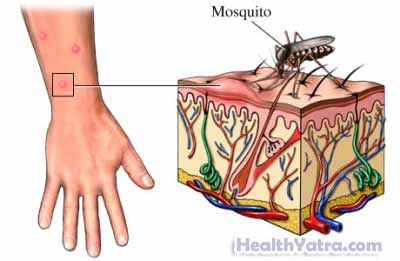সংজ্ঞা
Insect bites and stings may be caused by a variety of bugs. You may or may not know what bit you. A bite or sting may go unnoticed or can cause irritating skin reactions. Most bites and stings can be safely treated at home.
For some people, insect bites or stings can cause severe allergic reactions. These reactions will require prompt medical attention. If you think that you are having a severe allergic reaction, get medical help immediately.
কারণসমূহ
Insect bites and stings are caused by:
- Biting insects (eg, mosquitoes, fleas, and ticks)
- Stinging insects (eg, bees, yellow jackets, hornets, wasps, and fire ants)

ঝুঁকির কারণ
Your chance of being bitten or stung by an insect is increased if you:
- Work or spend a lot of time outdoors
- Live in warmer climates
- Fail to use proper protection
- Forget to use flea and tick preventive measures for pets
- Collect insects as a hobby
লক্ষণ
Most insect bites and stings will cause a reaction in the skin around the bite. The most common symptoms include:
- Mild swelling
- লালভাব
- ব্যাথা
- তাপ
- চুলকানি
Symptoms of a severe allergic reaction include:
- নিঃশ্বাসের দুর্বলতা
- ঘ্রাণ
- Swelling, redness, or hives covering most of your body
- A feeling that your throat is closing up
- বমি বমি ভাব বা বমি হওয়া
- Chills, muscle aches, or cramps
- দুর্বলতা
- জ্বর
- পেটে ব্যথা
- Headache sweating
If you have or suspect a severe allergic reaction, get medical help immediately.
রোগ নির্ণয়
Not all insect bites or stings require medical attention.
If you have had a severe reaction, your doctor will ask about your symptoms and medical history. A physical exam will be done. You will be asked about the type of insect that bit or stung you. If possible, try to obtain a sample of the insect.
Your doctor will use this information to understand what is causing your symptoms and how to treat them.
চিকিৎসা
পারিবারিক যত্ন
Most insect bites and stings can be safely treated at home. After a bite or sting consider the following steps:
- Wash the affected area with soap and water.
- Place an ice pack or cold compress on the affected area. Use the ice for about 15 minutes every few hours. Do not place the ice directly on the skins
- To help relieve itching consider:
- Use calamine lotion
- অ্যান্টিহিস্টামাইনস
- Topical steroid cream (eg, hydrocortisone )
- To reduce swelling or pain consider acetaminophen or ibuprofen .
Sometimes the insect or part of the insect may be left behind in the skin. Removing them will help the area heal and avoid further irritation or infection.
- To remove a stinger—Use a sharp edge, such as a credit card. Gently scrape the edge over the site to push the stinger out.
- To remove a tick—Use tweezers to grasp the tick by the head. Pull the tick gently but firmly up and away from the skin. Hold the tick just above the skin until it releases its bite.
- Ticks can carry infections like Lyme disease or Rocky Mountain Spotted fever. The sooner you remove the tick the smaller the chance of infection.
- Note: if the tick’s mouth break off in the skin it can be left there. It does not pose an infection risk. The mouth will be pushed out during normal skin growth.
Medical Attention
Medical help is needed for severe allergic reactions. Once you arrive at the hospital, treatment may include:
- Emergency treatment to stabilize life-threatening symptoms
- Medications to reduce swelling and other allergic reactions
- IV তরল
If you are diagnosed with an insect bite of sting, follow your doctor’s instructions .
প্রতিরোধ
To help reduce your chances of getting an insect bite or sting, take the following steps:
While outdoors, in areas with insects:
- Use insect repellents. These work against biting insects such as mosquitoes.
- Reduce the amount of exposed skin. Wear long sleeve shirts and pants when possible.
- Avoid sweet-smelling perfumes, deodorants, lotions, hair sprays, and colognes.
- Avoid wearing bright colors.
- Wear gloves when gardening.
Avoid areas or times when insects are most active:
- Stay inside at dawn and dusk. Mosquitoes are most active during these times.
- Stay away from areas where mosquitoes breed, such as areas around still water.
- Use caution around areas where insects nest. Areas include walls, bushes, trees, and open garbage cans.
- Be cautious in areas where spiders might be hiding. Areas include undisturbed piles of wood, seldom-opened containers, or corners behind furniture.
- Do not disturb bee or wasp nests.
Control pests around your home:
- Keep foods covered as much as possible when eating outdoors.
- Cover outdoor garbage cans with tight-fitting lids.
- Remove any areas of still water from around your house. This may include turning over lids or pots around your yard that have collected rain water.
- Use flea and tick control for pets. Regularly treat your home for fleas during warmer months.
- Treat fire ant mounds with insecticides.
